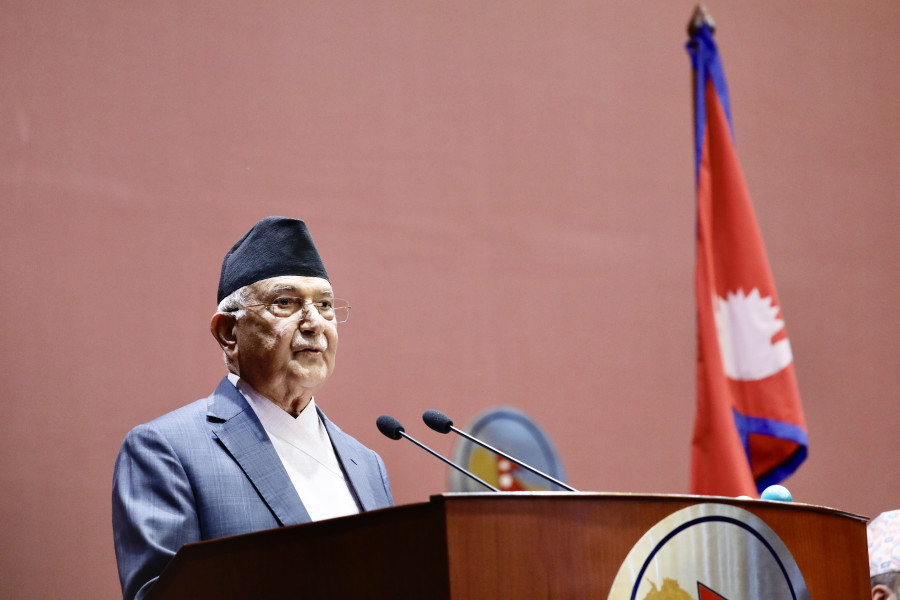National
PM outlines costs and benefits of LDC exit
Says shift to developing country status brings recognition, but also economic challenges.
Anil Giri
After being ranked among the Least Developed Countries (LDCs) for 55 years, Nepal is set to graduate to a developing country status in November next year, Prime Minister KP Sharma Oli informed the National Assembly on Wednesday.
“It is known to all that Nepal has long been striving to graduate from the status of an LDC to a developing country,” said Oli. On November 18, 1971, the United Nations General Assembly had passed Resolution No 2768, listing Nepal as an LDC.
“Now, 55 years later, we have the opportunity for graduation. Nepal, which has led the LDC group of 45 countries, will graduate along with seven other countries next year. This is a matter of pride. Our international image will improve—and it signals that Nepal is moving towards self-reliance. Our country’s rating index will strengthen, and the investment environment will improve.”
With Nepal graduating from LDC status, some of its ramifications have begun to be felt, said officials.
Accompanying the rise in Nepal’s per capita income, the World Bank has increased its annual interest rate on its loan to Nepal from 0.75 percent to 1.5 percent, Dhaniram Sharma, head of International Economic Aid Coordination Division at the Ministry of Finance, told reporters on Tuesday.
“Effective this July, the World Bank has increased the interest rate,” said Sharma. “We have been receiving such a loan on condition of repayment within 40 years. The maturity period has now been cut to 30 years,” he added.
More lenders could increase interest rates in the future as the country graduates.
“Through initiatives such as ‘visit diplomacy’, ‘Sagarmatha Sambad’, and investment summits , we have the opportunity to bolster economic diplomacy,” said the prime minister. “As most of Nepal’s trade and cooperation are bilateral, this graduation is not expected to significantly impact those areas.”
The graduation will enhance Nepal’s international image, improve its country rating, and create a favorable investment environment, he said. “Nepal will have the chance to strengthen its economic diplomacy through visit diplomacy and investment conferences.”
Nepal has been working towards graduation since 2010 through periodic plans, budgets, and programmes. The United Nations’ assessments in 2015, 2018, and 2021 noted Nepal’s progress in the Human Assets Index and the Economic and Environmental Vulnerability Index. However, only recently has there been improvement in per capita gross national income, which is why Nepal is getting this opportunity in 2026.
“This progress reflects the successful implementation of our 15th and ongoing 16th development plans, aiming for a ‘Prosperous Nepal and Happy Nepali’,” said the prime minister.
But critics say Nepal is not prepared as it will now lose several concessions like grant, aid and concessional loans.
“Positive signs of economic improvement are starting to appear. The goals, vision, and objectives of the current 16th Plan—centered on social justice, good governance, and prosperity—have been designed with post-LDC graduation in mind,” said Oli.
Following the graduation, Nepal will lose some of the special benefits it receives as an LDC, including trade preferences from the World Trade Organization, benefits under the United Nations, and assistance from bilateral partners like the World Bank and the European Union, said the prime minister.
“There may be reductions in support in sectors like health and education. Nepal’s development may also be challenged by the impacts of climate change and natural disasters,” he added.
To prepare for the graduation, Nepal began international diplomatic initiatives through the Ministry of Foreign Affairs last year. The government has adopted and implemented a ‘smooth transition strategy’ via the National Planning Commission.
Several committees have been formed to implement this strategy, including a high-level steering committee, implementation and coordination committee, a federal evaluation committee, and provincial-level implementation committees chaired by chief ministers.
Oli said that to sustain the graduation, some laws need to be repealed, amended, or newly enacted, and that process has begun.
“Efforts have been made to strengthen foreign relations through effective diplomacy. The effectiveness of implementing international treaties and agreements is increasing. Bilateral and multilateral cooperation is helping to mobilize international aid, attract investments, and secure concessional loans,” Oli told the upper house.
The government is also taking measures like reviewing and amending the procurement law and construction-related policies and rules, as well as strengthening institutional capacities, Oli said. “Efforts are being made to improve infrastructure and connectivity, transforming Nepal from a ‘land-locked’ to a ‘land-linked’country”.
We are working to develop value chains through multinational companies, said the prime minister.




 10.12°C Kathmandu
10.12°C Kathmandu















